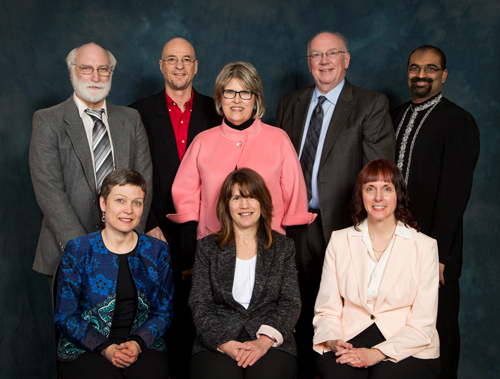
 Seated: Claudia Walters, Suzanne Bergeron, Julie Anne Taylor
Seated: Claudia Walters, Suzanne Bergeron, Julie Anne Taylor
Standing: Thomas Steiner, Stephane Spoiden, Provost Kate Davy, Chancellor Daniel Little, Nehal Patel
The Distinguished Teaching Award recipients are Julie Anne Taylor, associate professor of social studies and multicultural education, in the tenured category; Nehal Patel, assistant professor of criminal justice and sociology, in the non-tenured category; and Thomas Steiner, LEO lecturer II in computer and information science, in the lecturer category.
Stéphane Spoiden, professor of French, received the Distinguished Research Award; Suzanne Bergeron, director of women’s and gender studies, received the Distinguished Service Award; and Claudia Walters, LEO lecturer II in geography, received the Collegiate Lecturer Award.
Taylor has revitalized the social studies and multicultural education programs at UM-Dearborn with new approaches to teaching and curriculum design.
Colleagues say that Taylor exemplifies the teacher-scholar model. Her use of her own research and the resources of the surrounding community enriches her teaching, capturing students’ imagination and transporting them to historical places and times.
“Over the years, students have repeatedly stated that Dr. Taylor’s enthusiasm is contagious, that each of her classes is ‘an event,’ and that her concern for her students is energizing,” said one nominator.
Taylor’s contributions to the university include the creation of several new courses, the development of state-approved teacher preparation programs in numerous academic areas and community engagement throughout Detroit and the metropolitan area.
In the community, she served on the University Musical Society Teacher Advisory Committee for years and she created the History, Art, and Culture Club at Douglass Academy in Detroit last fall. Colleagues note that Taylor continually reinforces the lesson that arts and the humanities speak to societal values and, thus, have high worth as instructional tools in the social studies as well.
Taylor frequently looks to enhance her own knowledge and has attended workshops at institutions such as the National Archives, the National Gallery of Art and the Smithsonian American Art Museum.
Patel’s core teaching motivation is for students to develop empathy, the capacity of seeing things from others’ points of view. By building that skill, he says, students develop sophisticated thinking that allows the views of others to become a part of their own conceptual repertoires, leading to success in any chosen vocation.
His use of an alter ego—Professor Kingsfield—to conduct the Socratic teaching method during some class periods is a development of his empathy-based teaching. The tool allows Patel to simultaneously keep students on their toes (as Kingsfield) and help guide them as a friendly professor (as himself).
“Dr. Patel balances the need to challenge students with the need to supportively facilitate learning throughout the experience,” said one nominator. “ allows Dr. Patel to maintain a collaborative and supportive connection with his students, while also providing him an avenue for being a demanding and challenging presence in the classroom.”
Patel’s leadership has transformed the criminal justice program. Since joining the UM-Dearborn faculty in 2009, Patel has worked to strengthen the focus on law in the criminal justice studies program, revitalizing the curriculum by creating three new multi-disciplinary courses.
He also listened to students’ concerns and revitalized the criminal justice internship course to further serve its function as a "bridge course" that connects college experience to future employment.
Steiner’s extensive industry background provides students with a better understanding of their studies, connecting classroom theories with specific examples he has experienced.
Steiner has worked in the College of Engineering and Computer Science for more than 30 years. Over that time, he has taught a wide breadth of topics, teaching more than 40 different courses in areas including software engineering, databases, computer architecture, networking, data structures and programming.
Steiner’s knowledge base comes from his full-time work at Ford Motor Credit Company. He often brings ‘real-word’ business and IT resources from the company to provide additional perspective to students.
“Professor Steiner applies a level of realism to class that applies both class objectives, as well as real-world experience that he derives from his extensive work experience,” said one nominator. “His purpose and views in class are consistently clear and he integrates valuable information into every class, making each class an active learning experience that cannot be missed.”
Outside of the classroom, Steiner has made presentations to and advised on projects for the university’s chapter of the Association for Computing Machinery. He has participated in UM-Dearborn’s career services mock interviews and has acted as a Ford Motor Company/Ford Motor Credit Company UM-Dearborn recruiter.
Spoiden’s primary research interest is the question of cultural transmission, and he currently is conducting research in two fields: the European Union and 19th century French politics.
His work is praised by colleagues for both its breadth and depth. Spoiden has published two single-authored books, one edited collection and numerous articles in leading journals in his field. He has presented more than 40 papers at conferences and has organized numerous panels and two colloquiums.
“He works at the intersection of a few disciplines, drawing upon multiple literatures and bodies of thought in innovative ways that enhance our understanding of key current phenomenon,” said one nominator. “This makes him not only a dynamic scholar, but also a sought-after teacher and colleague who lends unique insight to every situation.”
Globally, colleagues see his work as vital to his field as reflected by his invitation to be on the editorial board and to serve as book review editor for Contemporary French Civilization and to write an anchor essay each year in the French Review.
Closer to home, Spoiden brings his knowledge and scholarship interest into the classroom, challenging students to think and inquire about socio-cultural issues. His research also has helped shape the discipline on campus—he was the first in the discipline to offer an online course and has been the driving force behind the global studies minor.
Bergeron’s commitment to service is exemplified by the work she’s done to promote women’s issues on campus.
Bergeron has served as director of the Women’s and Gender Studies program since 2006 and as associate director from 2001-2003. During that time, she developed the rationale and curriculum that led to a Women’s and Gender Studies major at the university. Her continued leadership in the program has contributed to an increased student interest in the field.
Bergeron also provided leadership to create the Women’s Resource Center and the Women in Learning and Leadership (WILL) program, designed to develop the analytical abilities and skills of undergraduate women and promote their will to become community leaders. Colleagues site WILL as one of the most tangible connections linking faculty service and campus mission.
She has served on numerous committees, advisory boards and task forces, including the General Education Task Force, the Social Sciences Executive Committee, the LGBTQ Task Force, and the SOAR advisory board.
In the metro Detroit community, Bergeron has volunteered to co-teach women’s studies to inmates at a local women’s prison. Included among her service to the profession is co-founding the Feminist International Political Economy Research Network and serving as the current book review editor of the International Feminist Journal of Politics.
“UM-Dearborn is a far richer campus because of the work of Professor Suzanne Bergeron,” said one nominator. “Few faculty members on this campus give as much of themselves for the betterment of the campus community as does Suzanne.”
Walters’ teaching and service to the university has spanned 11 years and has seen the growth of the geography program.
Walters’ dedication to the geography program helped create a geography minor that launched this semester. She also acted as the liaison with the School of Education to develop a geography minor for education majors. She has proposed new courses including Global Climate Change, Mapping Our World and an introductory GIS course.
She has been involved in the expansion of GIS opportunities on campus. Walters worked with Jacob Napieralski to fine-tune the GIS certificate curriculum and has been an advocate for more GIS faculty workshops.
Walters is one of the few lecturers on campus to conduct active, grant-funded research, currently investigating atmospheric wind patterns. She has provided funded research opportunities for undergraduate students. And in the classroom, students note that Walters takes a personal interest in their success.
“Claudia is a passionate scientist, researcher and educator who has been the champion for discipline over the years,” one nominator said. “She represents the best of what our UM-Dearborn faculty has to offer to students, this institution and the greater community.”




